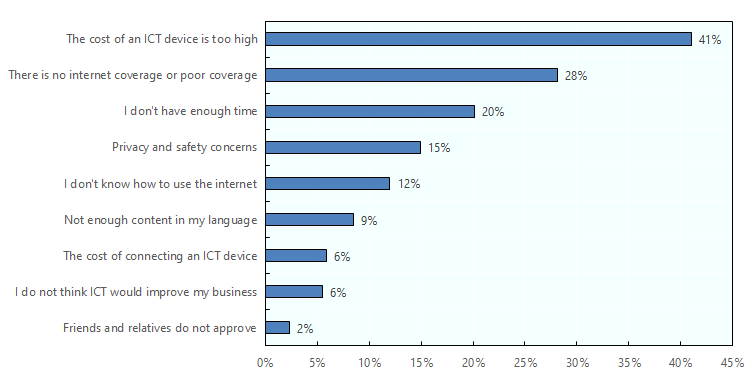The promises of digitalisation for women entrepreneurs in the MENA region
March 2022 - Digital transformation mitigates some traditional barriers to women’s entrepreneurship in the Middle East and North Africa (MENA).
The series of regional dialogue organised by the MENA-OECD Women’s Economic Empowerment Forum (WEEF) highlighted the potential benefits of the ongoing changing nature of entrepreneurship for MENA women’s entrepreneurs. The digitalisation of production processes and adoption of digital technology by businesses allow for new business models and facilitate the realisation of entrepreneurial projects operating from home. For example, online payment and e-commerce innovations simplify trade across borders and enable entrepreneurs to reach new markets, wherever they are. In addition, tech companies tend to be less capital and labour intensive. These new ways of doing business might particularly benefit MENA women, who often struggle to reconcile paid work and family responsibilities, and face impediments in accessing capital, leasing and owning property.
Moreover, the dematerialisation of services, including through digital platforms, lifts constraints that MENA women entrepreneurs usually experience in registering business, getting adequate funding, accessing entrepreneurship programmes and developing new skills and networks. For example, building on the digital approaches to improve access channels, digital financial services — including those involving the use of mobile phones — can enhance women’s financial inclusion, especially in remote areas. Evidence show that women entrepreneurs formerly excluded and underserved are increasingly moving from exclusively cash-based transactions to formal financial services — payments, transfers, savings, credit, insurance, and even securities — using digital technology.
However, the uneven access to digital tools and skills threatens to leave already disadvantaged women entrepreneurs behind.
Women entrepreneurs are not equals before the promises of digitalisation. A recent UNIDO survey conducted in Algeria, Egypt, Jordan, Lebanon, Morocco, Palestinian Authority and Tunisia in 2019-20, showed that only one quarter of women entrepreneurs reports using digital technologies at some stage in the product design, manufacturing and selling processes. The relative high cost of buying an ICT device (41%) is the first reason of ICT underuse among women-led businesses (Figure 1). In addition, poor internet connectivity (28%) highly restricts women entrepreneurs’ use of digital tools for their business activities. This is particularly true for rural women. On average, 44% of rural areas in MENA countries benefit from 4G mobile network coverage, compared to 76% of urban areas.
Today, successful entrepreneurship also requires digital skills along with the drive for innovation. Yet, 12% of MENA women entrepreneurs reported the lack of digital literacy as the principal barrier to use the internet, with up to 17% for the low educated compared to 4% for the tertiary-graduated. While 65% of MENA women entrepreneurs were willing to receive training on ICT devices and software, only 25% actually received such training.
Figure 1. Main barriers experienced by women entrepreneurs in using the internet
Percentage of women entrepreneurs

Source: UNIDO (forthcoming), Baseline Study “Women entrepreneurs’ access to and use of information and communication technologies in the manufacturing sector".
About the MENA-OECD Women’s Economic Empowerment Forum (WEEF)
The WEEF is a regional platform for policy dialogue where governments, private sector and civil society representatives from MENA and OECD economies can exchange good practices and find solutions for enhancing women’s economic empowerment. The WEEF series of regional dialogues on “Women’s Economic Empowerment and Digitalisation in MENA economies” outlines good practices for harnessing the potential of digital technologies to close the gender gap in the MENA region.
Further reading
- OECD (2022), “How to foster women’s entrepreneurship in the MENA digital sector? Barriers and success factors” Event Conclusions
- OECD (2022), “Gender-sensitive education and skills development policies in the MENA region: Developing girls’ digital skills in the post-COVID-19 world” Event Conclusions
Related Documents

